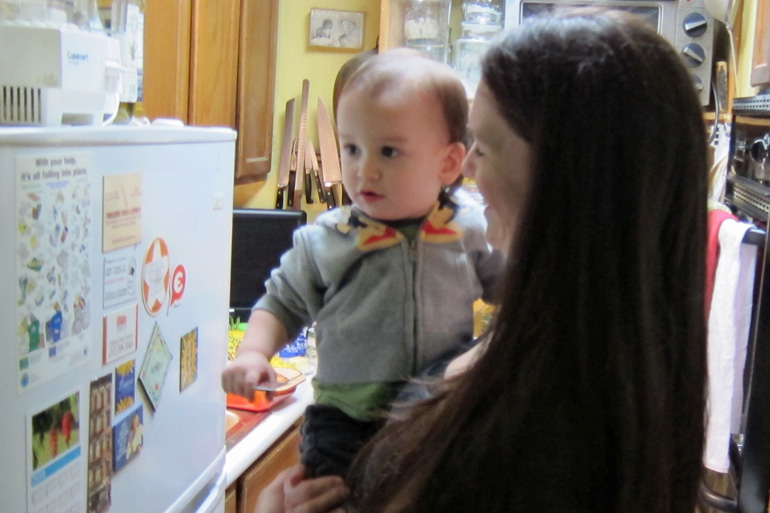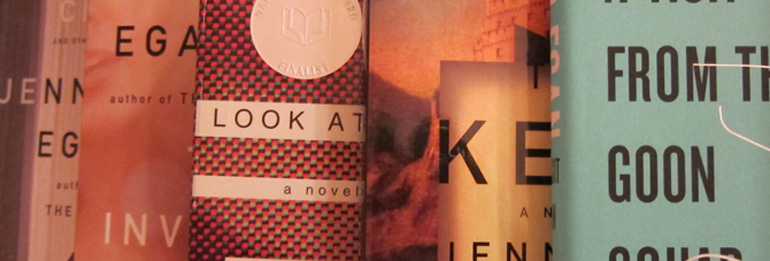
Matins
¶ Nobody who read James Gleick’s Chaos needs to be told that his new book, The Information, a a must-read. (Brainiac)
For Gleick, the essence of information is abstraction. Information exists where one thing (an idea) is abstracted into another thing (a word). But it’s also important that information be granular – broken down into what Shannon called “bits.” It’s this combination of abstraction and regularity that makes the idea of information so useful. The information age arrived, Gleick explains, not with the alphabet, the telephone, or the internet, but when, after it was “made simple, distilled, [and] counted in bits, information was found to be everywhere.”
Lauds
¶ Megan Lewit knows why Yanks don’t remake Brit comedy very well: “our Anglo friends take their comedy much as they take their tea: black.” Are Americans fundamentally too nice to be hipsters? (The Awl) ¶ We’ve never seen Friday Night Lights, and Kevin Nguyen’s hommage is probably not going to change that, but we read it with great interest just the same. “And maybe that’s the hardest part of selling Friday Night Lights to the uninitiated: it’s a show about football where the football is the least important part.” (The Bygone Bureau) ¶ Dan Callahan’s hot-pressed ode to the neo-noir films of the Eighties and Nineties makes us appreciate the original noirs all the more: watching people smoke cigarettes can be made to be so much more interesting than — well, something with Rachel Ward and Jason Patric called After Dark, My Sweet.
Foley cuts to a shot of Ward’s hands digging into the small of Patric’s back, which is lightly covered with hair. This is an image another movie might not show you; another movie might have made Patric shave that hair on his back, or made Ward cover the lines under her eyes, but After Dark, My Sweet seems to have an almost French appreciation for “flaws” like this and views them as turn-ons.
¶ Jens Laurson sits through Mahler’s Seventh (the Bavarian Radio Symphony Orchestra, conducted by Bernard Haitink) and nicely captures the adolescent grandeur of this fuzzy masterpiece, less difficult than the Sixth but more daring and “out there.”
Prime
¶ While waiting to be able to deliver their new plane, the 787 Dreamliner, Boeing executives and engineers must surely be finding the abstract of John Hart-Smith’s brilliantly titled study, “Out-Sourcing Profits: the Cornerstone of Successful Subcontracting,” to be horribly prescient (as well as fantastically readable). They must be wishing that Hart-Smith’s bosses at Boeing, for whom he wrote his cautionary presentation in 2001, had listened. “The point is made that not only is the work out-sourced; all of the profits associated with the work are out-sourced, too.” (via MetaFilter) ¶ Bob Cringely tells us that “the Silicon Valley startup ecosystem isn’t the American startup ecosystem.” The American system is slower and cheaper. (I, Cringely)
Tierce
¶ Yves Smith parses a mailing from a progressive group that’s trying to change JP Morgan Chase’s foreclosure policies — the group wants the bank to be more willing to modify mortgages — and shows how really lame the group’s proposals are. And she makes two suggestions that would probably offer help more effectively to troubled homeowners — and neither of them involve negotiating or pleading with JPMorgan Chase.. (Naked Capitalism) ¶ With slightly more patience, Robert Reich asks for a Democratic Party plan to counter the Republicans’ strategy of dividing the middle- and lower-classes along union/non-union lines (which today is pretty much a public sector/private sector divide.) ¶ Chris Mooney regards the complex of right-wing think tanks as an alternative to academia that’s less intellectually rigorous. “And now, while good liberals worry about academic balance, these think tanks are out there trouncing reality on a regular basis.” (The Intersection) ¶ Testosterone may increase athletic performance, but in the end it’s only going to let traders down — and, come to think of it, any man who’s supposed to be thinking. (Dynamic Hedge @ The Reformed Broker) ¶ Philip Greenspun rightly judges David Brooks’s “answer” to Tyler Cowen’s The Great Stagnation — Brooks argues that young Americans “seek meaning not money” — is unworthy of a Times columnist. ¶ Amy Westervelt reports on a connection between light pollution and cancer — particularly the cancers that require hormones to grow. This is not offered as a scare but as something to think about. Is worrying in the dark better than worrying in front of the computer? (GOOD) ¶ Finally: “Viewers should not have to adjust the volume at every commercial break, and we will work with the broadcasting industry to find an acceptable solution.” Commercials in Canada won’t be so much louder. (CBC News; via Arts Journal)
Sext
¶ Choire Sicha mourns the death of email. “I recently witnessed an entire passive aggressive confrontation occur in the comment sections of other people’s Tumblrs! It wasn’t even taking place on their own Tumblrs! That’s just how distributed conversation has gotten.” What’s Tumblr? <wink> (The Awl) ¶ One of the funniest writers on the Internet, Jimmy Chen, confesses to being “addicted to sad.” Somewhat more problematically, he also uses Vuillard’s The Newspaper to illustrate an essay that concerns his own failure as a painter. Of course we forgive him. Vuillard, after all…  (HTMLGiant) ¶ Dominique Browning is too polite to put it categorically, but although you can’t always respond to a question with the required degree of interest, but you must never, ever dismiss what another person asks as a “bad question,” or as “boring and banal.” These maladroit moves remind us of the old saw that “boring is not where you are, it’s who you are.” ¶ Stephen Sherrill’s spoof of a book proposal actually written by Shrub isn’t the timeliest funny piece in the world, but it’s too delicious to overlook. It reminds us that the late president was what used to be called “affected,” but in an inverse way: a born patrician, he pretended to sound working class. Amazingly if not surprisingly, the gambit succeeded. (GQ; via The Rumpus)
Nones
¶ Rupa Sengupta muses on the “glocal” dissemination of American “soft power” — its pop-culture leadership. N “The future seems to be about partnerships, not one-way tickets; cross-currents, not hegemonies.” (Times of India; via Real Clear World) ¶ Morgan Meis takes a dry-eyed look at Al-Jazeera’s funding and still concludes that it may be journalism’s best hope — for the time being. (The Smart Set; via 3 Quarks Daily) ¶ Hugh Miles, writing about Libya, reminds us that “Unlike Tunisia and Egypt, Libya has substantial oil wealth and steps have been taken to placate the people by raising salaries and releasing some political prisoners.
Vespers
¶ What ought to be a crashingly unreadable downtown review of a difficult poet becomes, under the touch of Olga Zilberbourg, an intriguing encounter with a reader whom you’d like to know better — even if you “know better.” Here’s the premise: “This is certain: I read Coolidge in the context of my experience, and my experience is grounded in 20th C Leningrad-St. Petersburg poetry.” You’ll have to teake it from me that the experience is fertile. (HTMLGiant) ¶ Bill Morris, asked to write a blurb for a friend’s book, swallows hard but gets a truly fine essay out of the experience that fingers all the complexities of this dark and undismissible subject. Also, happy ending: he can write a nice blurb with a clear conscience. (The Millions)
Compline
¶ Catherine McNally, a librarian from the Liverpool area, writes a defense of libraries that presents her own branch as a kind of community center for the exchange of information. One wonders how quiet it is, and how quiet, in this age of headphones, it ought to be. (Guardian; via Arts Journal) ¶ Rick Gekoski wants us to stop talking rot about the virtues of “books” and “reading,” and he quotes an apt line of Philip Larkin: “I should never call myself a book lover any more than a people lover. It all depends what’s inside them.” (Ditto; Ditto)
Have a Look
¶ Spencer Murphy’s “Fallen Empire” project: the “ruins” of a Chinese theme park in Florida. (via The Best Part) ¶ Molly Lewis wants to have Stephen Fry’s child, and her boyfriend thinks it’s okay. She is one talented song-writer. (YouTube; via MetaFilter) ¶ The Beatles — as they’ll be understood a thousand years from now. (Death to the History Channel!) (via Brainiac)
Noted
¶ Now you can make your own Coca-Cola at home. (This American Life; via kottke.org) ¶ Blake Butler writes from Level Zero. (HTMLGiant) ¶ The Weakonomist on “biflation.” (Weakonomics) ¶ Americans with passports; per capita by state (Grey’s Blog) ¶ We are not going to wax sentimental about this story of the last days of Borders; we’d have done the same thing. (I, Cringely)













